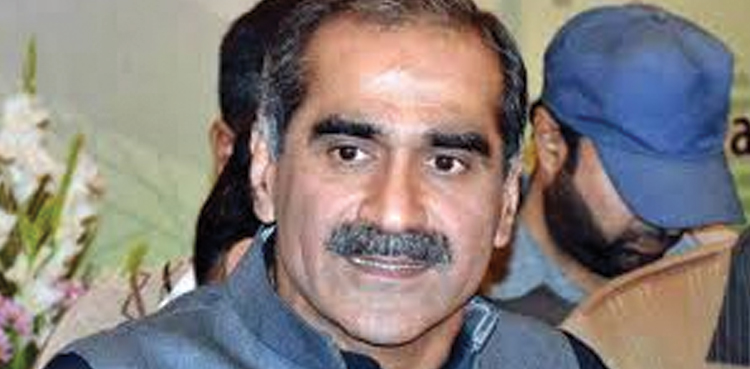
Negotiations with PTI Should Be Successful, No one’ Politics Cannot Be Buried. Saad Rafiq
Khawaja Saad Rafiq stated that the negotiation process with PTI should be successful and emphasized that no one’s political career can be buried.
He also expressed concern over incidents such as the blocking of the Kohala Bridge or the removal of Pakistan’s flag or the image of Quaid-e-Azam, questioning how such things could happen.
He pointed out that some people who are currently in jail may still not understand the situation. Those currently in power have already experienced being in jail, and if they do not unite, the cycle of jail terms will continue.
U.S. administration have no interest in Imran Khan but are focused on Pakistan’s nuclear and ballistic missile programs, similar to past U.S. colonial interests.
He further stressed that Pakistan cannot progress with a “remote control democracy.”
Senior politicians to reflect on the country’s situation and work together to get the nation back on track, warning that without unity, the country would face further problems. Saad Rafiq
He made these remarks while addressing a seminar, emphasizing that the political leaders should come together and find solutions to the ongoing crises.
LAHORE (Web News)
Senior politician and former federal minister of the Pakistan Muslim League (Nawaz), Khawaja Saad Rafiq, stated that the country is currently embroiled in internal conflicts, and if the situation persists, many people will become irrelevant. He emphasized that Pakistan cannot advance with a “remote control democracy,” but also noted that it is unacceptable for only politicians to bear the brunt. Speaking at a national seminar held in Lahore to commemorate the 52nd martyrdom anniversary of his father, Khawaja Muhammad Rafiq Shaheed, Saad Rafiq expressed concerns over certain developments. He mentioned that if the Kohala Bridge is blocked or Pakistan’s flag or the image of Quaid-e-Azam is removed, it raises significant questions about how such incidents occurred.
He questioned why people were allowed to take such actions without considering the national sentiment, particularly in Kashmir, where people’s hearts beat with Pakistan. He also raised concerns about the appointment of individuals in positions related to Kashmir politics, stating that their lack of connection with Kashmir’s issues raises doubts.
Saad Rafiq stressed that he is not part of the current government, though he is firmly within his own party. He noted that he could no longer remain silent about the country’s political issues, and that it was time to discuss and find solutions to these problems. He also criticized the new American administration, asserting that it has no interest in former Prime Minister Imran Khan but is focused on Pakistan’s nuclear program and ballistic missile development. He further emphasized that the country’s enemies understand Pakistan’s power, even if its own leadership does not fully realize it.
Regarding the current political turmoil, Saad Rafiq said that the responsibility for where the country stands today lies with the founders of PTI, former Chief Justice Saqib Nisar, and former army chief General Bajwa. He also mentioned that PTI members deny their mistakes and want to pursue a fascist mindset, which led them to overthrow the previous government.
He expressed support for ongoing political negotiations, but stressed that these negotiations must be unconditional. He called for serious discussions to resolve the political crisis and suggested forming a national committee comprising stakeholders who are not part of the government or PTI, such as Maulana Fazlur Rehman, Hafiz Naeem-ur-Rehman, Shahid Khaqan Abbasi, Dr. Malik Baloch, Aftab Khan Sherpao, Pir Pagara, and Chaudhry Nisar Ali Khan. Saad Rafiq emphasized the importance of senior politicians coming together to bring the country back on track before further damage is done.
He added that no one can bury politics, as the politics of leaders like Zulfikar Ali Bhutto and Nawaz Sharif could not be erased, and similarly, politics cannot be stopped through undemocratic means.
Renowned journalist and intellectual Sohail Waraich agreed with Saad Rafiq’s statement, emphasizing the importance of adhering to the Constitution for democracy to move forward. He acknowledged the potential for political parties to cooperate, citing past instances of reconciliation between PPP and PML-N.
Mujeeb-ur-Rehman Shami, another prominent journalist, reflected on the legacy of Khawaja Rafiq, noting that he remained committed to the Pakistan Movement and fought against military dictatorships. He remarked that political unity and staying away from non-political powers were the key to overcoming the country’s crises.
Saad Rafiq concluded by noting that Pakistan is a unique country where the future of its government is always in question. He stressed that the country’s political battles have severely weakened the state and economy, and urged all political factions to unite and end the practice of attacking Islamabad. He called for an end to protests and confrontations, citing Bangladesh’s struggles as a reminder of the consequences of internal strife.

